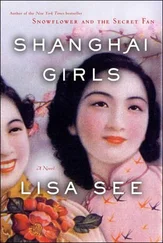Lisa See - Peony in Love
Здесь есть возможность читать онлайн «Lisa See - Peony in Love» весь текст электронной книги совершенно бесплатно (целиком полную версию без сокращений). В некоторых случаях можно слушать аудио, скачать через торрент в формате fb2 и присутствует краткое содержание. Жанр: Старинная литература, на английском языке. Описание произведения, (предисловие) а так же отзывы посетителей доступны на портале библиотеки ЛибКат.
- Название:Peony in Love
- Автор:
- Жанр:
- Год:неизвестен
- ISBN:нет данных
- Рейтинг книги:4 / 5. Голосов: 1
-
Избранное:Добавить в избранное
- Отзывы:
-
Ваша оценка:
- 80
- 1
- 2
- 3
- 4
- 5
Peony in Love: краткое содержание, описание и аннотация
Предлагаем к чтению аннотацию, описание, краткое содержание или предисловие (зависит от того, что написал сам автор книги «Peony in Love»). Если вы не нашли необходимую информацию о книге — напишите в комментариях, мы постараемся отыскать её.
Peony in Love — читать онлайн бесплатно полную книгу (весь текст) целиком
Ниже представлен текст книги, разбитый по страницам. Система сохранения места последней прочитанной страницы, позволяет с удобством читать онлайн бесплатно книгу «Peony in Love», без необходимости каждый раз заново искать на чём Вы остановились. Поставьте закладку, и сможете в любой момент перейти на страницу, на которой закончили чтение.
Интервал:
Закладка:
Then, during the Festival of the Bitter Moon, which occurs during the darkest, cruelest days of winter, I discovered something that shattered me.
Just before the first anniversary of my death, my father returned home for a visit and my mother prepared special Bitter-Moon porridge with various grains, nuts, and fruits, flavored with four different kinds of sugar. My family gathered in the ancestral hall and offered the porridge to Grandmother and others in the family. Once again, my ancestor tablet wasn’t brought out of its hiding place in the storage room and I didn’t receive an offering. I knew I hadn’t been “forgotten”; Mama cried bitter tears for me every night. This neglect meant something far worse.
( 1 2 3 )
Grandmother, who must have been somewhere eating her porridge with Grandfather, saw what happened and came to me. She was a plain speaker, but I didn’t want to hear or accept what she had to say.
“Your parents will never worship you,” she explained. “It goes against nature for a parent to worship a child. If you’d been a son, your father would have beaten your coffin to punish you for being so unfilial as to die before him, but eventually he would have relented and seen that you were provided for. But you’re a girl—unmarried at that. Your family will never make offerings to you.”
“Because my tablet isn’t dotted?”
Grandmother snorted. “No, because you died unmarried. Your parents raised you for your husband’s family. You belong to them. You are not considered a Chen. And even if your tablet were dotted, it would be kept out of sight behind a door, in a drawer, or in a special temple, which is what happened to those girls who visit you.”
I’d never heard any of this before, and for a moment I believed Grandmother. But then I shook her bad thoughts out of my head.
“You’re wrong.”
“Because no one told you before you died that this would happen? Ha!
If your mother and father put your tablet on the family altar, they would risk punishment from the other ancestors.” She held up a hand. “Not from me, but there are others here who hold to the traditional ways. No one wants to see such an ugly thing on the family altar.”
“My parents love me,” I insisted. “A mother who didn’t love her daughter wouldn’t have burned her books to try to keep her alive.”
“This is true,” Grandmother agreed. “She didn’t want to do it, but the doctor hoped it would spark anger in you so strong that you’d be shaken from your path.”
“And Baba wouldn’t have mounted the opera for my birthday if he hadn’t loved me like a precious pearl.”
Even as the words left my mouth I felt they were wrong.
“The opera wasn’t for you,” Grandmother said. “It was for Commissioner Tan. Your father was lobbying for his appointment.”
“But Commissioner Tan disapproves of the opera.”
“So he’s a hypocrite. Men in power often are.”
Was she suggesting my father was a hypocrite too?
“Political loyalty is a natural extension of personal loyalty,” Grandmother went on. “I’m afraid your father—my son—has neither.”
( 1 2 4 )
She said nothing more, but the expression on her face caused me to look back—to finally see —and understand what I’d ignored in life.
My father was not a Ming loyalist or the man of integrity I’d always believed him to be, but from my perspective this was minor. In life, I’d known my father regretted I was a girl. Despite that, in my heart I’d believed, truly believed, that he cherished, adored, and loved me, but the fact of my tablet and all it implied—that I was an unmarried girl being raised for another family—had proved otherwise. With no one to care for me through my tablet in the earthly realm, my soul was in terrible trouble.
I was like a torn-off remnant of silk. That I’d been abandoned—
orphaned—in this way provided one explanation for why I was stuck on the Viewing Terrace.
“What’s going to happen to me?” I cried. Only a year had passed, and already my gown had faded and I’d grown thinner.
“Your parents could send your tablet to a maiden’s temple, but this is a distasteful idea, since those places house not only the tablets of unmarried daughters but those of concubines and prostitutes as well.” Grandmother drifted across the terrace and sat down next to me. “A ghost marriage would remove the ugly thing from the Chen Family Villa—”
“I could still marry Ren. My tablet would be used in the ceremony.
Everyone would see my missing dot,” I said hopefully. “It would be dotted, and from then on my tablet would be worshipped on the Wu family altar.”
“But your father hasn’t arranged that. Think, Peony, think. I’ve been telling you to look, really look. What have you seen? What do you see right now?”
Time is strange here: sometimes fast, sometimes slow. Now it was days later, and another succession of young men visited my father.
“Baba has appointments. He’s an important man.”
“Don’t you listen, child?”
Business belonged to the outer realm. I’d deliberately not listened to my father’s conversations, but I did now. He was interviewing those young men. Instantly I was terrified that he was trying to arrange a ghost marriage for me to someone other than Ren.
“Will you be loyal and filial?” he inquired of one young man after another. “Will you sweep our graves at New Year and make offerings in our ancestral hall every day? And I need grandsons. Can you give me grandsons to care for us after you’re gone?”
( 1 2 5 )
Hearing these questions, Baba’s intention became clear. He was going to adopt one of those young men. My father couldn’t have sons—an embarrassment for any man and a disaster when it came to ancestor worship.
Adopting one for purposes of filial piety was common enough and Baba could afford it, but I was being replaced in his heart completely!
“Your father did a lot for you,” Grandmother said. “I saw how solici-tous he was of you—teaching you to read, write, and question. But you weren’t a son, and he needed one.”
My father had shown me devotion, love, and many kindnesses over the years, but I now saw that my being a girl had diminished me in his affec-tions. I cried and Grandmother held me.
Barely able to accept any of this, I looked down to Ren’s home, hoping his family might have offered me porridge. Naturally, they hadn’t. Ren stood beneath an awning in the pouring rain, relacquering in cinnabar red the front gate to his family compound as a symbol of the rebirth of the coming New Year, while in my father’s library a young man with small eyes signed a contract of adoption. My father patted the young man on the back and said, “Bao, my son, I should have done this many years ago.”
( 1 2 6 )

The Cataclysm
i t i s sa i d that death i s eve r f ol lowe d by l i f e and the end is always a new beginning. Clearly that is not how it was for me. Before I knew it, a river of seven years rolled past.
Holidays and feast days—especially the New Year—were particularly hard for me. I had been thin when I died, and without offerings I became frailer and more translucent with each passing year until now I was little more than a wraith. The single gown I’d worn here was faded and frayed. I’d become a pathetic creature, always hovering by the balustrade, unable to leave the Viewing Terrace.
The lovesick maidens came to visit for New Year, knowing how sad I would be. I enjoyed their company, because—unlike in the Chen Family Villa—we had no petty jealousies between us. After all this time, they finally brought Xiaoqing. She was exquisite. Her forehead was high, her eyebrows were painted, her hair was festooned with ornaments, and her lips were soft and pliant. She wore a gown of the old style—elegant, flowing, decorated with flowers—and her feet were so tiny that she appeared weightless as she swayed delicately onto the terrace. She was too beautiful ever to have been a wife, and I could see why so many men had been entranced by her.
Читать дальшеИнтервал:
Закладка:
Похожие книги на «Peony in Love»
Представляем Вашему вниманию похожие книги на «Peony in Love» списком для выбора. Мы отобрали схожую по названию и смыслу литературу в надежде предоставить читателям больше вариантов отыскать новые, интересные, ещё непрочитанные произведения.
Обсуждение, отзывы о книге «Peony in Love» и просто собственные мнения читателей. Оставьте ваши комментарии, напишите, что Вы думаете о произведении, его смысле или главных героях. Укажите что конкретно понравилось, а что нет, и почему Вы так считаете.












